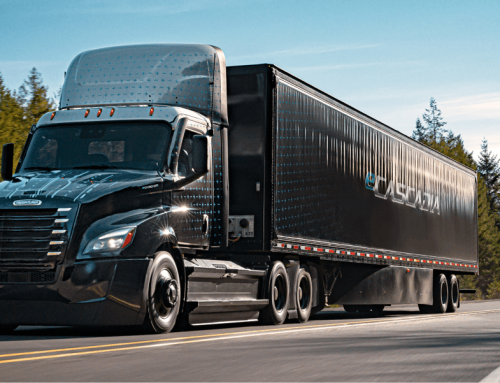Do you know the single biggest factor affecting your fuel economy?
No, its not your tires, or even the hills you are climbing…. ITS YOU!
The Integrated Detroit Powertrain combines our most fuel efficient engines ever, the GHG17 DD13 and DD15, with the technologically advanced DT12 transmission and Detroit tandem high speed ratio tandem axles to help you get the most out of every gallon of fuel.
With engine technology calibrated to deliver greater horsepower and torque at lower RPMs, the flagship DD13 and DD15 engines keep your truck in top gear longer and cruise at a more efficient engine speed. It’s a known fact that slowing down is one of the best ways to save fuel, so we’ve designed our engines to cruise at the same road speed at lower RPMs, reducing friction and fuel consumption.
The combination of downsped engines, Detroit’s fastest-ever ratio tandem axles and the new, smooth shifting, fuel efficient DT12 automated manual transmission work together seamlessly, making the Integrated Detroit Powertrain even more fuel efficient.
Up to 70% of fuel economy is affected by factors that can be addressed and corrected. Fuel represents one of the highest operating costs that fleets and owner operators face, so tracking fuel consumption and taking action to optimize fuel efficiency is critical.
TRUCK MAINTENANCE MATTERS!
Tire Inflation and Wear – Every 10 psi of under inflation reduces fuel economy by approximately 2%. Over time that can mean many gallons wasted. Matching your tire to the application is also critical, as aggressive treads can reduce your MPG average.
Axle Alignment – No matter your type of axle, keeping it properly aligned has a positive effect on fuel economy and reduces tire wear.
Air Conditioning Compressor – About 50% of total fan on time is from using the air compressor. The more you operate your vehicle with the fan on and AC compressor running, the more power is drained from the engine. This means the engine has to work harder to move the load so it uses more fuel.
Lubricants – Synthetic lubricants increase the functionality and efficiency of your engine. Their superior temperature stability and improved viscosity at low temperatures reduces pumping and spin power losses.
When it comes to maximizing fuel economy, nothing is more important than having a good driver behind the wheel. Optimizing driver habits alone can improve fuel economy by up to 30 PERCENT! It’s critical to educate drivers on improving fuel economy through reducing highway speeds, shortening idle times, properly selecting gears and servicing the truck regularly.
Top Tips For Fuel Economy:
Slow down
Keep RPMs low
Anticipate road terrain and traffic condition
Reduce stops
Avoid Idling (According to Detroit engineers, 1 min of idle cool-down time is sufficient)
Reduce trailer gap (Aerodynamics account for 20% of fuel economy)
Use progressive shifting
Stay in top gear
Use cruise control
Brought to you by Demand Detroit.

